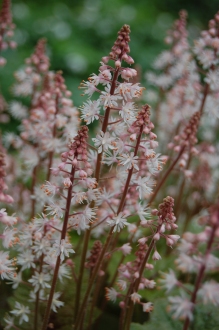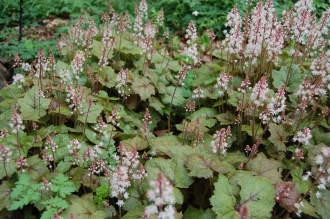Position: Partial to full shade
Flowering period: Late spring to early summer
Soil: Moist, well drained
Eventual Height: 40 cm
Eventual Spread: 50 cm
Hardiness: 3a, 3b, 4a, 4b, 5a, 5b, 6a, 6b, 7a, 7b, 8a, 8b, 9a
Family: Saxifragaceae
Tiarella wherryi is a slow growing, clump forming herbaceous perennial. Its pale green leaves are palmate, deeply lobed with dentate margins, becoming tinged with maroon as they mature and are up to 10cm long and across. Its white to pink flowers are up to 6mm across and appear in racemes on slender spikes. Its has a crown shaped fruit. Its roots are rhizomatous but do not produce runners, so this plant does not spread from its roots.
Tiarella wherryi, commonly known as Foamflower, is native to North America. Tiarella wherryi is synonymous with Tiarella cordifolia var. collina.
The etymological root of the binomial name Tiarella is derived from the Greek tiara ‘a turban’, referring to the shape of the seed pod. Wherryi is named after Dr. Edgar T. Wherry (1885 – 1982) an American mineralogist and botanist who discovered the species.
The landscape architect may find Tiarella wherryi useful as an effective low growing herbaceous ground cover plant. It is also useful in dappled shade location including woodland settings. Rabbits and deer tend not to eat this plant.
Ecologically, Tiarella wherryi is attractive to bees and pollinating insects.
The Royal Horticultural Society has given Tiarella wherryi their prestigious Award of Garden Merit in 1993.
Tiarella wherryi prefers moist, humus rich, well-drained soils. It tolerates most pH of soil. It will not tolerate waterlogged soils.
Tiarella wherryi requires little maintenance. Large clumps may be divided in early spring.







Leave a comment